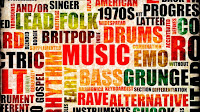Heavy Metal is not my favourite form of music, though Zed Zeppelin and Cream, the two bands most often associated with creating the genre, are among my top rated bands.
I am often put off by the immature imagery associated with Heavy Metal - the fancore, the comic violence, the conservatism and nerdyness. Heavy Metal is not cool - the association is that it is liked by awkward teenage boys who are shy, spotty and a bit geeky. The masculine attributes portrayed by the bands: the bikes, jeans, leather gear, love of gore and black magic, appears to appeal to young men who want to be more masculine than they are. This is not music for gays, nor intellectual liberals, nor is it good time party music, it tends to be dark, heavy, metallic, and almost deliberately off-putting.
The common understanding is that the music is simple, and does not progress or explore - indeed, does not want to progress or explore. If it does develop, the development is more into itself: louder, darker, faster, more metal, more gore, more of the same. And yet it can be technically accomplished, with high expectations of the musicians - the guitarists in particularly. Fast and complex guitar solos are admired as much as heavy riffs. Big booming drums with engaging rhythms. That musicianship was set up by Cream and Zeppelin and Deep Purple. The dark, simplistic, heavy, repetitive aspects were added by Black Sabbath. A combination of massive dark riffs with crackling speedy electric lead seems to be much admired.
I don't like Heavy Metal. But I also don't like Jazz. And I think they both have much in common. Both are forms of music much admired by men who are not good at socialising, particularly with women. Both have musical elements that are not designed for mass appeal, nor for beauty, nor for dancing. Both can be deliberately abrasive and technical. The technical accomplishments of the musicians can be admired over and above the basic aesthetic appeal of the music.
I am curious. I want to learn more, and shall be exploring the history and development of Heavy Metal, and the main bands who make up this genre.
The path to Heavy Metal
No music form simply springs into life without a gestation period. At the point where bands are starting to explore musical ideas, some of the strands that make up the new music will have been around for a while, and it is those strands which give the bands the ideas for the new music.
Wikipedia says:
Heavy metal's quintessential guitar style, built around distortion-heavy riffs and power chords, traces its roots to early 1950s Memphis electric blues guitarists such as Joe Hill Louis, Willie Johnson, and particularly Pat Hare, who captured a "grittier, nastier, more ferocious electric guitar sound" on records such as James Cotton's "Cotton Crop Blues" (1954); the late 1950s instrumentals of Link Wray, particularly "Rumble" (1958); the early 1960s surf rock music of Dick Dale, including "Let's Go Trippin'" (1961) and "Misirlou" (1962); and The Kingsmen's version of "Louie, Louie" (1963), which made it a garage rock standard.
And I'll start by looking at those musicians before moving on to the early British blues movement, which is traditionally where the roots of Heavy Metal are found.
OK. What Willie Johnson and Pat Hare were doing was building on the electric blues guitar sound of T-Bone Walker and later Muddy Waters. T-Bone starting recording in 1929 with "Wichita Falls Blues", but it's his work from the 1940's onwards with "Mean Old World" in 1942, and "Call it Stormy Monday" in 1947 that demonstrate his importance and influence. Muddy Water's most important piece is "Rollin Stone"; recorded in 1950, it's just Muddy Waters singing and playing his electric guitar with a heavy driving rhythm, alternating a fat, fuzzy rhythm with peaks of sharp notes. Pat Hare's "I'm Gonna Murder My Baby" is a blistering piece of guitar work, though clearly shows the influence of T-Bone and Waters, as does Willie Johnson's guitar work on Howling Wolf's 1951 "How Many More Years".
I don't see the connection between Johnson and Hare (and particularly Joe Hill Louis) with the emergence of Heavy Metal nearly twenty years later. They are not part of any continuum, so to be an influence it would have to be assumed that one or more of Eric Clapton, Jimmy Page, Jeff Beck, Ritchie Blackmore, Tony Iommi were copying elements of their style; but I don't think there's any evidence of that. The evidence more clearly lays in the influences on the early British blues movement, which was mainly Muddy Waters who toured the UK in 1958, playing his amplified electric blues. The route from T-Bone Walker to Led Zeppelin via the British blues movement is fairly straightforward. And while Dick Dale's 1963 "Misirlou" is a stirring and exciting piece of guitar work, it's a dead end. It's only famous now because of Tarantino's Pulp Fiction. It would have had less impact on the early Heavy Metal guitarists than British instrumentals, such as The Shadows' 1960 "Apache", or the American Duane Eddy, with his 1958 "Rebel Rouser". On the other hand, The Kingsmen's "Louie Louie", with its sheer enthusiasm and verve which transcends and obliterates ability is key to many aspects of rock music, and Heavy Metal is one. "Louie Louie"'s influence is clear in The Kinks, The Who, Jimmy Page and other early British guitarists.
***
 |
| Music Styles & Genres |
 |
Kitchen Table Music Blogs |
